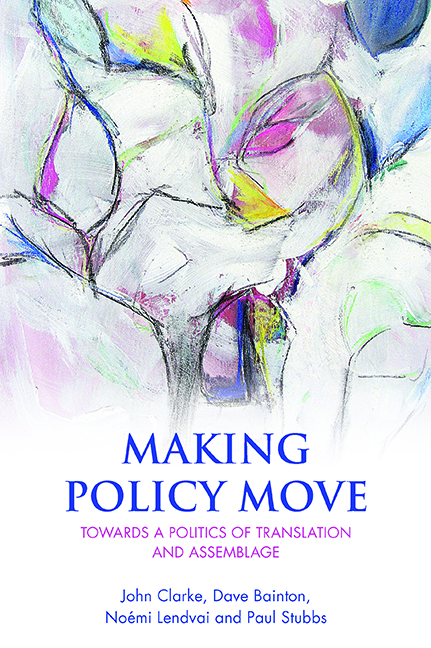Book contents
- Frontmatter
- Contents
- Introduction
- One Moving policy studies
- Two Translation, assemblage and beyond: towards a conceptual repertoire
- Three Performing reform in South East Europe: consultancy, translation and flexible agency
- Four The managerialised university: translating and assembling the right to manage
- Five Soft governance, policy fictions and translation zones: European policy spaces and their making
- Six Translating education: assembling ways of knowing otherwise
- Seven ‘Policy otherwise’: towards an ethics and politics of policy translation
- References
- Index
Introduction
Published online by Cambridge University Press: 07 March 2022
- Frontmatter
- Contents
- Introduction
- One Moving policy studies
- Two Translation, assemblage and beyond: towards a conceptual repertoire
- Three Performing reform in South East Europe: consultancy, translation and flexible agency
- Four The managerialised university: translating and assembling the right to manage
- Five Soft governance, policy fictions and translation zones: European policy spaces and their making
- Six Translating education: assembling ways of knowing otherwise
- Seven ‘Policy otherwise’: towards an ethics and politics of policy translation
- References
- Index
Summary
Policy moves. It moves from place to place: from the head offices of supranational organisations to the (more or less) grateful recipients in faraway elsewheres; or from the strategic stratosphere to the gritty encounters of the front line. Policy moves – and the fact of its movement makes things happen. What happens is not necessarily what was intended, or what was planned. Policy moves – and moves on, colonising new spaces and new settings with the promise of improving things. All of this is well-known – in the world of policymaking and moving, and in the world of policy studies. However, this book emerges from a sense of puzzlement: ‘How does policy move?’; ‘Who and what makes it move?’; ‘What happens as it arrives and settles in those “elsewheres”?’; ‘What keeps it moving?’; and ‘What happens to it as it moves?’ Linked to this sense of puzzlement – and the questions that preoccupy us – is a sense of frustration: why are these not the organising questions of policy studies? Why do the questions and answers of so much academic work on policy leave us cold? This mix of puzzlement and frustration brings us to this point: writing a book about making policy move.
Over the last decade, we have found ourselves in recurring conversations and collaborations, despite our geographically and institutionally distributed lives. Those conversations have continually returned to the puzzles and the frustrations that link us. In that time, we have shared our frustrations, exchanged sources of excitement and inspiration, and explored ways of thinking about how policy moves and what happens as it does. In particular, our conversations have led us to this collaboration – in which we try to see what happens if we use the ideas of translation and assemblage (and others) to think about policy moves. Doing a book is itself a practice of translation – in which we move from talking to ourselves (and small audiences at conferences and workshops) to addressing unseen others. Translation – as we suggest in the book – is a risky practice: much can be lost in translation and unanticipated meanings and effects can be gained.
- Type
- Chapter
- Information
- Making Policy MoveTowards a Politics of Translation and Assemblage, pp. 1 - 8Publisher: Bristol University PressPrint publication year: 2015

